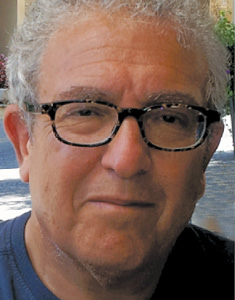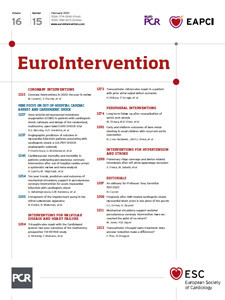
Professor Tony Gershlick was an internationally renowned clinician, teacher and researcher in the field of interventional cardiology. He was highly sought after as a lecturer and live case operator at training courses and conferences all around the world, as well as a familiar, and prolific, presenter of original research in Late-Breaking Trials sessions at all the main international interventional cardiology conferences. He was also a popular and much valued collaborator amongst colleagues across the globe.
Tony Gershlick was born in Essex, UK, in 1951. He was from a working-class background and had dyslexia, although this only became apparent later on in his education. Despite this, he got the necessary grades to enter medical school at St Mary’s Hospital in London. Amongst other achievements, Tony was an accomplished and skilful rugby player during this time. After an initial interest in renal medicine at Guy’s Hospital, Tony was unable to find a suitable post and so chose cardiology as his career specialty, training at the National Heart and then the London Hospital. As Tony himself remembered about those days1, “The National Heart Hospital was a place of absolute inspiration. People like Magdi Yacoub were there when I was there. It was not just that I could not get a renal job. These people were inspirational in the way they can change your career. On the basis of that, I decided to stay in cardiology”. He was appointed to a Senior Registrar position at the London Chest Hospital in 1984, when he was further inspired by Raphael Balcon and Martin Rothman, the latter sitting at the vanguard of the development of interventional cardiology at that time. Tony developed a strong research interest, initially in the field of platelet reactivity. In 1989, Tony took up an academic post at Leicester University, and was then appointed as an NHS consultant at Leicester Hospitals in 1993.
Tony Gershlick was always a frontline clinical interventional cardiologist. His dexterity and clinical excellence allowed him to play a pioneering role in many of the main developments in the field of coronary intervention, including restenosis, rescue PCI, and then primary PCI, CTO PCI, left main PCI and antiplatelet pharmacology. His high clinical workload and teaching style led to his becoming highly sought after as a clinical supervisor, and he was responsible for the training of scores of UK interventional cardiologists over the years. Tony’s style was to “look after” these junior doctors, often going out of his way to advise and support them in their further careers. Tony was also an avid fan of live cases at training meetings and conferences, and he had become a well-known and highly entertaining operator at a wide variety of UK and international meetings. As a speaker, Tony was witty, engaging, provocative and inspiring. He loved making and presenting slides and spent many hours producing visually elaborate and elegant talks.
It is in the field of original research that Tony’s impact will be felt most widely. His inquisitive and restless intellect drove him to tackle an enormously wide variety of research questions involving every methodology from basic science and animal models to multicentre clinical trials. As a consequence, his publication record was prolific. In the process, his portfolio of national and international collaborators was exceptional and, as a result, he became an effective and well-liked ambassador for UK intervention abroad, paving the way in the process for many others. In the UK, the completion of Tony’s REACT trial was a pivotal moment in the expansion of interventional cardiology research output. A multicentre, randomised trial of rescue PCI following failed thrombolysis in STEMI, published in the New England Journal of Medicine in 2005, it was the first time that this had been achieved in our field in the UK. This outcome had a profound influence on a generation of academically minded junior colleagues, who have been inspired to produce an ever increasing body of research trials and studies that have put UK intervention on the world stage.
After REACT, Tony continued to lead or contribute to many practice-changing trials (ELUTES/CVLPRIT/STREAM/EXCEL/RAPID NSTEMI/DAPT to name just a few). Tony’s pioneering achievements were recognised in the UK by the British Cardiovascular Intervention Society in 2017 when he was the recipient of the first ever Lifetime Achievement award.
Tony’s professional legacy will be as a teacher and trainer to generations of current interventionists, and as an original thinker and trialist who pushed back knowledge boundaries that have had direct consequences on frontline patient care. Most interventional cardiologists will have been touched at some point by a talk, a rapier question or a moment of pure thought from Tony at one meeting or another. Most interventionists who knew Tony will remember his hunger to ask the difficult questions and for debate, as well as his insistence on high standards and logical thought. As a person, his legacy will be as a passionate advocate for his chosen speciality and the colleagues, collaborators and staff that he worked with in pursuit of excellence within that field. His ability to pursue his goals and achieve so much in a manner that has attracted and shared so much friendship, amusement, infectious energy and enthusiasm is perhaps his greatest achievement. In 2009, Tony was the subject of an interview about his career and was asked about the future1. He replied, “There are challenges with exciting times ahead and there are many areas where we can significantly improve patient care. We have yet to see how far we can manage patients with coronary artery disease and just how far angioplasty will safely and effectively go”. However, it is the last thing he said that tells you everything you need to know about Tony, and why he was so outstandingly successful, “I am so shocked that they pay me to do what I do. It is a great, great job”.
Supplementary data
To read the full content of this article, please download the PDF.

